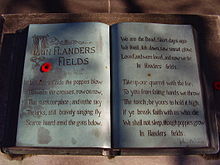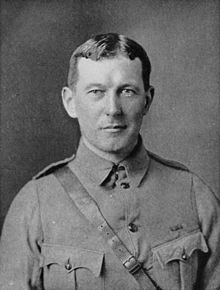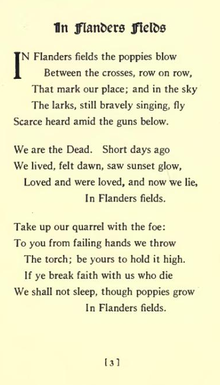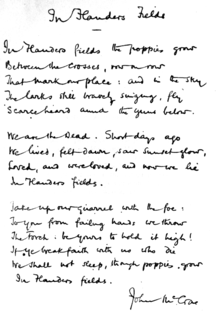在法蘭德斯戰場


在法兰德斯战场(英語:In Flanders Fields)是约翰·麦克雷(John McCrae)在第一次世界大戰期间写作的法式回旋诗体的英文詩,是当时最广为流传的诗作之一[1]。作者在第二次伊珀尔战役中目睹了他的年仅22岁的战友Alexis Helmer中尉的死,于第二天1915年5月3日创作该诗,同年12月将其发表在英国伦敦的双周刊Punch上。
法蘭德斯是第一次世界大戰中位于比利时与法国之间的战场。当时德國欲封鎖法國加莱,於是德軍進攻比利時,並在1914年10月和比利時、和支援比利時的法國軍隊在這裡開戰,雙方死亡慘重,而比利時盛開著虞美人花。因为这首詩,虞美人花成为全球國殤紀念日佩花。

原詩
[编辑]1919年麥克雷的作品集“法蘭德斯戰場及其他詩歌”的第一章,裡面的這首詩的原文如下:[2]
In Flanders fields the poppies blow
Between the crosses, row on row,
That mark our place; and in the sky
The larks, still bravely singing, fly
Scarce heard amid the guns below.
We are the Dead. Short days ago
We lived, felt dawn, saw sunset glow,
Loved and were loved, and now we lie,
In Flanders fields.
Take up our quarrel with the foe:
To you from failing hands we throw
The torch; be yours to hold it high.
If ye break faith with us who die
We shall not sleep, though poppies grow
In Flanders fields.
翻译
[编辑]
在法兰德斯战场,虞美人盛开
于十字架之间,一排接一排
标示着我们的所在,在天空中
勇敢的云雀仍在歌唱、翱翔
可却难以听见,因为枪炮正响
我们逝去了,就在短短几天前
我们曾有过生命,沐浴晨曦,瞻望夕阳
我们爱过他人,也为人所爱,而今已倒在
法兰德斯战场
捡起武器,继续同敌人战斗
从我们低垂的双手,接过火炬
让它由你们高高举起
倘若你们背弃了我们的遗志
我们将永不瞑目,纵使虞美人盛开
在法兰德斯战场
參見
[编辑]注释
[编辑]- ^ Paul Fussell, The Great War and Modern Memory, Oxford University Press, 2000, p. 248.
- ^ In Flanders Fields and Other Poems. G. P. Putnam's Sons. 1919: 3 [5 November 2010]. The typeset version of the poem ends the first line with "blow". The same book also includes McCrae's handwritten copy of the poem, in which the first line ends with "grow".
參考文獻
[编辑]- Bassett, John, The Canadians: John McCrae, Markham, Ontario: Fitzhenry & Whiteside Limited, 1984, ISBN 0-88902-651-3
- Fussell, Paul, The Great War and Modern Memory (Illustrated Edition), New York: Stirling Publishing, 2009 [1975], ISBN 0-19-513331-5
- Gillmor, Don, Canada: A People's History two, Toronto, Ontario: McClelland & Stewart, 2001, ISBN 0-7710-3340-0, ISBN 0-7710-3341-9
- McCrae, John, In Flanders Fields and Other Poems, Arcturus Publishing (reprint 2008), 1919 [2012-02-07], ISBN 1-84193-994-3, (原始内容存档于2014-01-01)
- Prescott, John F., In Flanders Fields: The Story of John McCrae, Erin, Ontario: Boston Mills Press, 1985, ISBN 0-919783-07-4
外部連結
[编辑]- Royal Canadian Legion web page about John McCrae, In Flanders Fields, and the custom of wearing poppies
- In Flanders Fields(页面存档备份,存于互联网档案馆), choral piece by composer Bradley Nelson, commissioned by Fresno State Chamber Singers and Chico State Chamber Singers of California State University
- In Flander's fields by Lt. Col. John McCrae, M.D. and America's answer by R. W. Lillard, 1914-1918(页面存档备份,存于互联网档案馆). Hamilton, Ont. : Commercial Engravers, 1918. 8 p. Accessed 4 January 2014, in PDF format.
 LibriVox中的公有领域有声书《In Flanders Fields》
LibriVox中的公有领域有声书《In Flanders Fields》
